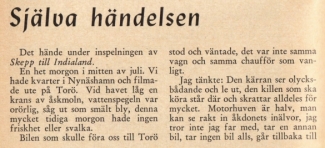As It Happened
Bergman explains how a brush with death gave him a new lease on life.

About the text
Bergman was traveling by car on the crooked and hilly road between Nynäshamn and Torö: “A mountainous stretch, vision obscured by the cliffs and trees as we swerve from lane to lane; my driver clearly knows these twists and turns like the back of his own hand.” Suddenly, they crash into an oncoming vehicle, and the car starts to “run up the side of a cliff.” The passengers and driver stumble out.
It was then I noticed:
That my feet moved all by themselves, and that I could feel the sensation of sand under my sandals, that my feet and the path were good friends;
That my back enjoyed the grass and the moss on a little stony hillock, that there were strawberries to be found;
That the wind began to rustle through a birch, that the breeze had the scent of the sea; that it began to rain despite the sunshine, with a veil of rain in the distance settling ever so softly over the white cliffs;
That it was pleasant to get a little wet on account of the rain;
That an old woman and a little girl were walking along a road and that they weren’t in any hurry, despite the downpour. The girl wore a green blouse and was laughing;
That all the blades of grass were so tall, providing umbrellas of protective greenery for the little bugs, that a yellow ant was very busy. That all of this can be seen if you just get down on the ground.
It was only when the tears came that it struck me: By God, we’re alive.
And then all the bits, pieces and divisions of the body began to respond and unite with my weeping. It all happened in an instant, like being struck by a lightning bolt of altogether new joy, perhaps even new consciousness.
The text ends with the acknowledgement that death is a part of life, and that this insight has affected the writing of Eve. “So is that what the film’s about?” someone interrupts.
No. Some people paint things on canvas, some make music; some people perform things, they’re called actors; countless others write verse, novels, dramas; a few chisel things out of stone, or sculpt things out of clay. Some of them even deserve to be paid for it. Everyone has their own way of expressing themselves.
And then what? I don’t get it. What are you trying to say with all of this?
- That I write films. That writing film can't be compared to anything else, even though it’s made up of bits of everything else. That may sound pretentious (God forbid), but I’m only trying to be honest.
But don’t you write plays as well?
I do, but they don’t get performed. That’s just how it goes, there’s no use in getting upset over it.
Filmnyheter 3, No. 20, 1948, pgs 4–7.